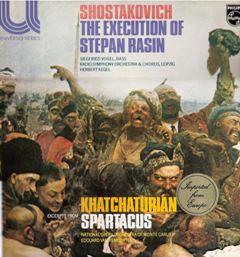Shostakovich – Execution of Stepan Razin Opus 119
Shostakovich – Execution of Stepan Razin Opus 119

1.Shostakovich - Execution of Stepan Razin Op.119 Siegfried Vogel - bass Leipzig Radio Symphony Orchestra Herbert Kegel – conductor 2.Khachaturian - Spartacus (two dances) National Opera of Monte Carlo Orchestra Eduard van Remoortel - conductor
‘The Execution of Stepan Razin’ is an interesting follow-up, even if a bit tough to pin down. On the surface, it is compliant with the aims of ‘good Soviet poetry and music’; yet Shostakovich was a little apprehensive that the piece might run afoul of the censors (Yevtushenko had been compelled, after the premiere of the Thirteenth, to alter eight lines of ‘Babi Yar,’ though this did not materially affect Shostakovich’s score). The tone of ‘Stepan Razin’ borrows a certain brutality of manner from that arch-Soviet poet, Mayakovsky; and takes Gogolian satire to a macabre edge, with Razin’s severed head staring down the Tsar, and laughing in mock triumph. And the overall story, the popular folk hero Stepan Razin who stood up to the Aristocracy and the wealthy Merchants, is readily interpreted as a parable of Revolution against corrupt Government, and scorn of selfish Capitalists.
There is a dialogue between Stenka Razin and the People, a turning point for the latter. Through the whole first part, the People are a supporting cast for the Tsarist spectacle of the public execution; the People revile Stenka, spit on him, and accuse him of defying them. Stenka explains his actions, apparently correctingmisconceptions on which the people of Moscow have been fed. He had imagined that, for a good Tsar, he might achieve something but there are no good Tsars.’ And the crowd berates him in echo: You fool, Stenka! There are no good Tsars!’
A denunciation of monarchy only (and therefore sound Socialist doctrine)? Or of all autocrats, whether monarchical or ... Communist (and therefore potentially seditious)? At the fatal block, Stenka is collected, and defiantly calls, Let fall the ax! A change comes over the people, they are quiet and still, even after they are commanded to dance (a command illustrated musically, in a way recollecting the ironic phrase from Testimony, Our business is being happy!) As one, they remove their hats in tribute.
Decades of cloudy Western scholarship on Shostakovich have yielded scant mention of The Execution of Stepan Razin, and that begrudging attention has routinely expressed casual dismissal. The murk began decades ago as a combination of ignorance and Cold-War ideology. Today there remains something of a fog of war as fierce partisanship takes hold of much of the musicological publication on Shostakovich. The irony of the equal-but-opposite sources of misinformation would not have escaped Shostakovich, to whom outward circumstances were so sustainedly hostile, that by his final years he was quite embittered. Yet fairness to the composer must still be the ideal, though he himself had ceased to hope for it. --- good-music-guide.com
download: uploaded yandex 4shared mediafire solidfiles mega zalivalka filecloudio anonfiles oboom
Zmieniony (Środa, 07 Maj 2014 13:52)








